Submitted:
30 October 2023
Posted:
31 October 2023
You are already at the latest version
Abstract
Keywords:
1. Introduction
1.1. Literature Review-Related Work
1.2. Paper outline
2. Theory - New Fuzzy Implication Methods
2.1. Theoretical framework of fuzzy implication
- If (decreasing as to the first variable)
- If (increasing as to the second variable)
- If
- The function f is continuous
- i
- ii
- iii
- The n is a genuinely decreasing function.
- i
- (commutativity property)
- ii
- (associative property)
- iii
- (border condition)
- iv
- if (monotonicity)
2.2. The new proposed family of fuzzy implication
- ▪
- For m=2 authors have:
- ▪
- For m=3 researchers have:
- ▪
- For m=4 authors have:
- ▪
- For m=5 researchers haveyVyVyVyVy=ŷ5=4y−6y2+4y3−y4+y−(4y−6y2+4y3−y4)·y=5y−10y2+10y3−5y4+y5
- ▪
- For m=6 authors have:yVyVyVyVyVy=ŷ6=5y-10y2+10y3-5y4+y5+y-(5y-10y2+10y3-5y4+y5)·y =6y-15y2+20y3-15y4+6y5-y6
- i
- The concept of monotonicity is studied with respect to the first variable, consequently with respect to x, we consider 0<x1< x2 so -x1>-x2⇔ 1-x1>1-x2 that is n(x1)>n(x2) that is n(x1)Vŷm>n(x2)Vŷm therefore f(x1,y)> f(x2,y) so the function decreasing
- ii
- Researchers find the monotonicity with respect to the second variable, therefore with respect to y, authors consider 0<y1< y2 so < therefore n(x)V< n(x)Vso f(x,y1)< f(x,y2) so the function increasing, because inductively we have :
- iii
- It has to be proven f(0,ω1)=1 that.
- iv
- It has to be proven f(1,ω2)=ω2 that.
- v
- Must f(ω1,ω1)=1 that is n(ω1)V=1 that is consequently f(0,0)=1 and f(1,1)=1
- vi
- Must to prove that f(x,f(y,z))=f(y,f(x,z))
- vii
- If f(x,y)=1 then x≤y
- viii
- Must f(x,y)=f(n(y),n(x))
- ix
- Since f producible in both variables means f continuous.
- i
- The concept of monotonicity is studied with respect to the first variable, therefore with respect to x, consequently decreasing
- ii
- Researchers find the monotonicity with respect to the second variable, therefore with respect to y, consequently increasing
- iii
- It has to be proven N(0,ω1)=1 that.
- iv
- It just has to be proven N(1,ω2)=ω2. Actually, N(1,ω2) = N(n(n(1))·(n(ω2))m) = N(n(0)·(n(ω2))m) = N(1·(n(ω2))m) = N(n(ω2))m) this applies to m=1 and it does N(1,ω2)=ω2 meaning that truth does not imply anything (truth neutrality).
- v
- Must Ν(ω1,ω1)=1 namely, N(ω1,ω1) = N(n(n(ω1))·(n(ω1))m) = N(ω1·(n(ω1))m) for the 5th property to hold α must be 0 or 1, namely
- vi
- Authors also want to show that N(ω1, N(ω2,x))=N(ω2, N(ω1,x))
- vii
- If N(x,y)=1 then x≤y therefore N(x,y)=1 1-x(1-y)m=1
- viii
- N(ω1,ω2)=N(n(ω2),n(ω1))
- ix
- Since Ν producible in both variables means Ν is continuous.
2.3. Description and application of the new proposed family of fuzzy implications
- I.
- First Case - Isosceles trapezium (trapezium membership function)
- II.
- Second Case - Random trapezium (trapezoidal membership function)
- III.
- Third Case - Isosceles triangle (triangular membership function)
- IV.
- Fourth Case - Scalene triangle (triangular membership function)
3. Results
4. Discussion
5. Conclusions and Future Work
Author Contributions
Funding
Data Availability Statement
Acknowledgments
Conflicts of Interest
References
- Ruan, D.; Kerre, E.E. Fuzzy implication operators and generalized fuzzy method of cases. Fuzzy Sets and Systems 1993, 54, 1, 23–37. ISSN 01650114. [CrossRef]
- Makariadis, S.; Souliotis, G.; Papadopoulos, B. Parametric fuzzy implications produced via fuzzy negations with a case study in environmental variables. Symmetry 2021, 13, 3, 509–529. MDPI AG. [CrossRef]
- Pagouropoulos, P.; Tzimopoulos, C.D.; Papadopoulos, B.K. A method for the detection of the most suitable fuzzy implication for data applications. In Communications in Computer and Information Science, Proceedings of the 18th International Conference on Engineering Applications of Neural Networks (EANN), Athens, Greece, 25-27 August 2017; Iliadis L., Likas A., Jayne C., Boracchi G. Eds.; Springer Verlag: Volume 744, pp. 242-255. ISBN 978-331965171-2. ISSN 18650929. [CrossRef]
- Pagouropoulos, P.; Tzimopoulos, C.D.; Papadopoulos, B.K. A method for the detection of the most suitable fuzzy implication for data applications. Evolving Systems 2020, 11, 3, 467-477. Springer. ISSN 18686478. [CrossRef]
- Botzoris, G.N.; Papadopoulos, K. Papadopoulos, B.K. A method for the evaluation and selection of an appropriate fuzzy implication by using statistical data. Fuzzy Economic Review 2015, 20, 2, 19-29. Int. Association for Fuzzy-Set Management and Economy. ISSN 11360593. [CrossRef]
- Rapti, M.N.; Papadopoulos, B.K. A method of generating fuzzy implications from n increasing functions and n + 1 negations. Mathematics 2020, 8, 6, art. no. 886, 1-15. MDPI AG. ISSN 22277390. [CrossRef]
- Bedregal, B.C.; Dimuro, G.P.; Santiago, R.H.N.; Reiser, R.H.S. On interval fuzzy S-implications. Information Sciences 2010, 180, 8, 1373-1389. ISSN 00200255. [CrossRef]
- Balasubramaniam, J. Contrapositive symmetrisation of fuzzy implications-Revisited. Fuzzy Sets and Systems 2006, 157, 17, 2291 – 2310, Elsevier. ISSN 01650114. [CrossRef]
- Jayaram, B.; Mesiar, R. On special fuzzy implications. Fuzzy Sets and Systems 2009, 160, 14, 2063-2085 Elsevier. [CrossRef]
- Wang, Z.; Xu, Z.; Liu, S.; Yao, Z. Direct clustering analysis based on intuitionistic fuzzy implication. Applied Soft Computing Journal 2014, 23, 1–8 Elsevier. ISSN 15684946. [CrossRef]
- Shi, Y.; Van Gasse, B.; Ruan, D.; and Kerre, E.E. On Dependencies and Independencies of Fuzzy Implication Axioms. Fuzzy Sets and Systems 2010, 161, 10, 1388-1405. ISSN 01650114. [CrossRef]
- Fernandez-Peralta, R.; Massanet, S.; Mesiarová-Zemánková, A.; Mir, A. A general framework for the characterization of (S, N)-implications with a non-continuous negation based on completions of t-conorms. Fuzzy Sets and Systems 2022, 441, 1–32, Elsevier. ISSN 01650114. [CrossRef]
- Fernández-Sánchez, J.; Kolesárová, A.; Mesiar, R., Quesada-Molina, J.J.; Úbeda-Flores, M. A generalization of a copula-based construction of fuzzy implications. Fuzzy Sets and Systems 2023, 456, 197-207, Elsevier. ISSN 01650114. [CrossRef]
- Madrid, N.; Cornelis, C. Kitainik axioms do not characterize the class of inclusion measures based on contrapositive fuzzy implications. Fuzzy Sets and Systems 2023, 456, 208–214, Elsevier. ISSN 01650114. [CrossRef]
- Pinheiro, J.; Santos, H.; Dimuro, G.P.; Bedregal, B.; Santiago, R.H.N.; Fernandez, J.; Bustince, H. On Fuzzy Implications Derived from General Overlap Functions and Their Relation to Other Classes. Axloms 2023, 12, 1, art. no. 17, pp: 1-24, MDPI. ISSN 20751680. [CrossRef]
- Zhao, B.; Lu, J. On the distributivity for the ordinal sums of implications over t-norms and t-conorms. International Journal of Approximate Reasoning 2023, 152, 284-296, Elsevier. ISSN 0888613X. [CrossRef]
- Massanet, S.; Mir, A.; Riera, J.V.; Ruiz-Aguilera, R. Fuzzy implication functions with a specific expression: The polynomial case. Fuzzy Sets and Systems 2022, 451, 176–195, Elsevier. ISSN 01650114. [CrossRef]
- Souliotis, G.; Papadopoulos, B. Fuzzy Implications Generating from Fuzzy Negations. In Lecture Notes in Computer Science (including subseries Lecture Notes in Artificial Intelligence and Lecture Notes in Bioinformatics), Proceedings of 27th International Conference on Artificial Neural Networks (ICANN 2018), Part 1, Artificial Neural Networks and Machine Learning, Rhodes, Greece, 4–7 October 2018; Kurkova V., Hammer B., Manolopoulos Y., Iliadis L., Maglogiannis I. Eds.; Springer-Verlag: Volume 11139 LNCS, p.p. 736-744. ISBN 978-303001417-9. ISSN 03029743. [CrossRef]
- Król, A. Generating of fuzzy implications. In 8th Conference of the European Society for Fuzzy Logic and Technology (EUSFLAT 2013) - Advances in Intelligent Systems, Proceedings of the 8th Conference of the European Society for Fuzzy Logic and Technology (EUSFLAT 2013), Milan, Italy, 11-13 September 2013; Pasi, G., Montero, J., Guicci, D. Eds.; Atlantis Press: Volume 32, pp. 758-763. ISBN 978-162993219-4. [CrossRef]
- Souliotis, G.; Papadopoulos, B. An algorithm for producing fuzzy negations via conical sections. Algorithms 2019, 12, 5, MDPI AG: art. no. 89. ISSN 19994893. [CrossRef]
- Yang, E. Fixpointed Idempotent Uninorm (Based) Logics. Mathematics 2019, 7, 1, MDPI AG : art. no. 107, Publisher: MDPI AG. ISSN 22277390. [CrossRef]
- Massanet, S.; Torrens, J.; Shi, Y.; Van Gasse, B.; Kerre, E.E.; Qin, F.; Baczyński, M.; Deschrijver, G.; Bedregal, B.; Beliakov, G.; Bustince, H.; Fernández, J.; Pradera, A.; Reiser, R.; Hliněná, D.; Kalina, M.; Král’, P.; Drewniak, J.; Sobera, J.; Baczyński, M.; Jayaram, B. Advances in Fuzzy Implication Functions, (Book Series: Studies in Fuzziness and soft Computing STUDFUZZ, volume 300 Series editor Kacprzyk J.) 1st ed.; Baczynski, M.; Beliakov, G.; Sola, H.B.; Pradera, A. Eds.; Springer Berlin, Heidelberg Germany, 2013; VII, p. 209, Hardcover ISBN: 978-3-642-35676-6, e-book ISBN: 978-3-642-35677-3, ISSN: 1434-9922, E-ISSN: 1860-0808. [CrossRef]
- Baczynski, M.; Jayaram, B. Fuzzy Implications, (Book Series: Studies in Fuzziness and Soft Computing STUDFUZZ volume 231, Series editor Kacprzyk J.), 1st ed.; Springer-Verlag Berlin Heidelberg, Germany, 2008; XVIII, p. 310, Hardcover ISBN: 978-3-540-69080-1, e-book ISBN: 978-3-540-69082-5, ISSN: 1434-9922, E-ISSN: 1860-0808. [CrossRef]
- Metcalfe, G.; Montagna, F. Substructural Fuzzy Logics. Journal of Symbolic Logic 2007, 72, 3, 834–864. ISSN 00224812. [CrossRef]
- Ruiz-Aguilera, D., Torrens, J. Residual implications and co-implications from idempotent uninorms. Kybernetika, 2004, 40, 1, 21–38. ISSN 0023-5954.
- Grammatikopoulos, D.S.; Papadopoulos, B.K. A Method of Generating Fuzzy Implications with Specific Properties. Symmetry 2020,12, 1, MDPI AG: art. no. 155. ISSN 20738994. [CrossRef]
- Massanet, S.; Torrens, J. The law of importation versus the exchange principle on fuzzy implications. Fuzzy Sets and Systems 2011, 168, 1, 47-69. ISSN 01650114. [CrossRef]
- Mayor, G. “Sugeno’s negations and t-norms”. Mathware and Soft Computing 1994, 1, 1, 93–98. ISSN 1134-5632.
- Smets, P.; and Magrez, P. Implications in fuzzy logic. International Journal of Approximate Reasoning 1987 1, 4, 327-347, Elsevier Science Publishing. ISSN 0888613X. [CrossRef]
- Cintula, P. Weakly Implicative (Fuzzy) Logics I: Basic properties. Archive for Mathematical Logic 2006, 45, 6, 673-704. [CrossRef]
- Klir, G.J.; and Yuan, Bo. Fuzzy Sets and Fuzzy Logic: Theory and Applications, 1st Ed.; Prentice Hall Press, UpperSaddle River, New Jersey, United States, 1995; pp. 5747. ISBN 10 0131011715.
- Trillas, E.; Mas, M.; Monserrat, M.; Torrens, J. On the representation of fuzzy rules. International Journal of Approximate Reasoning 2008, 48, 2, 583–597. ISSN 0888613X. [CrossRef]
- Botzoris, G.; Papadopoulos, B. Fuzzy Sets: Applications in Design-Management of Engineer Projects, 1st ed.; Sofia : Greece, Xanthi, 2015; p.p. 424, ISBN-13: 9789606706868 (Book in Greek).
- Dombi, J.; Jónás, T. On a strong negation-based representation of modalities. Fuzzy Sets and Systems 2021. 407, 142–160. ISSN 0165-0114. [CrossRef]
- Asiain, M.J.; Bustince, H.R.; Mesiar, R.; Kolesárová, A.; Takác, Z. Negations with respect to admissible orders in the interval-valued fuzzy set theory. IEEE Transactions on Fuzzy Systems 2018, 26, 2, 556-568. 1; ISSN 10636706. [CrossRef]
- Bustince, H.; Burillo, P.; Soria, F. Automorphisms, negations and implication operators. Fuzzy Sets and Systems 2003, 134, 2, 209-229. ISSN 01650114. [CrossRef]
- Drygas, P. Some remarks about idempotent uninorms on complete lattice. In Advances in Intelligent Systems and Computing, Proceedings of the 10th Conference of the European Society for Fuzzy Logic and Technology, Warsaw, Poland 11-15 September 2017; In Advances in Fuzzy Logic and Technology 2017, Proceedings of the EUSFLAT 2017 and 16th International Workshop on Intuitionistic Fuzzy Sets and Generalized Nets (IWIFSGN 2017), Warsaw, Poland 13-15 September 2017; Kacprzyk, J., Szmidt, E., Zadrozny, S., Atanassov, K.T, Krawczak, M., Eds.; Springer: Cham, Switzerland, volume 641, p.p. 648-657. ISBN 978-331966829-1. ISSN 21945357. [CrossRef]
- Baczynski, M.; Jayaram, B.; Massanet S.; Torrens, J. Fuzzy Implications: Past, Present, and Future. In Springer Handbook of Computational Intelligence Part of the Springer Handbooks book series (SHB), 1st ed.; Kacprzyk, J., Pedrycz, W., Eds.; Springer: Berlin/Heidelberg, Germany, 2015; pp.183-202. ISBNonline: 978-366243505-2, ISBNprint:978-366243504-5. [CrossRef]
- https://freemeteo.gr/mobile/kairos/kavala/istoriko/imerisio-istoriko/?gid=735861&station=5222&date=2021-08-01&language=greek&country=greece&fbclid=IwAR3Ph3AbGLWjGn39AWnLMqarYsgjypBRAtAG9gtcEITSWAVkDwEz4Hffn7M Retrieved: 4/5/2023.
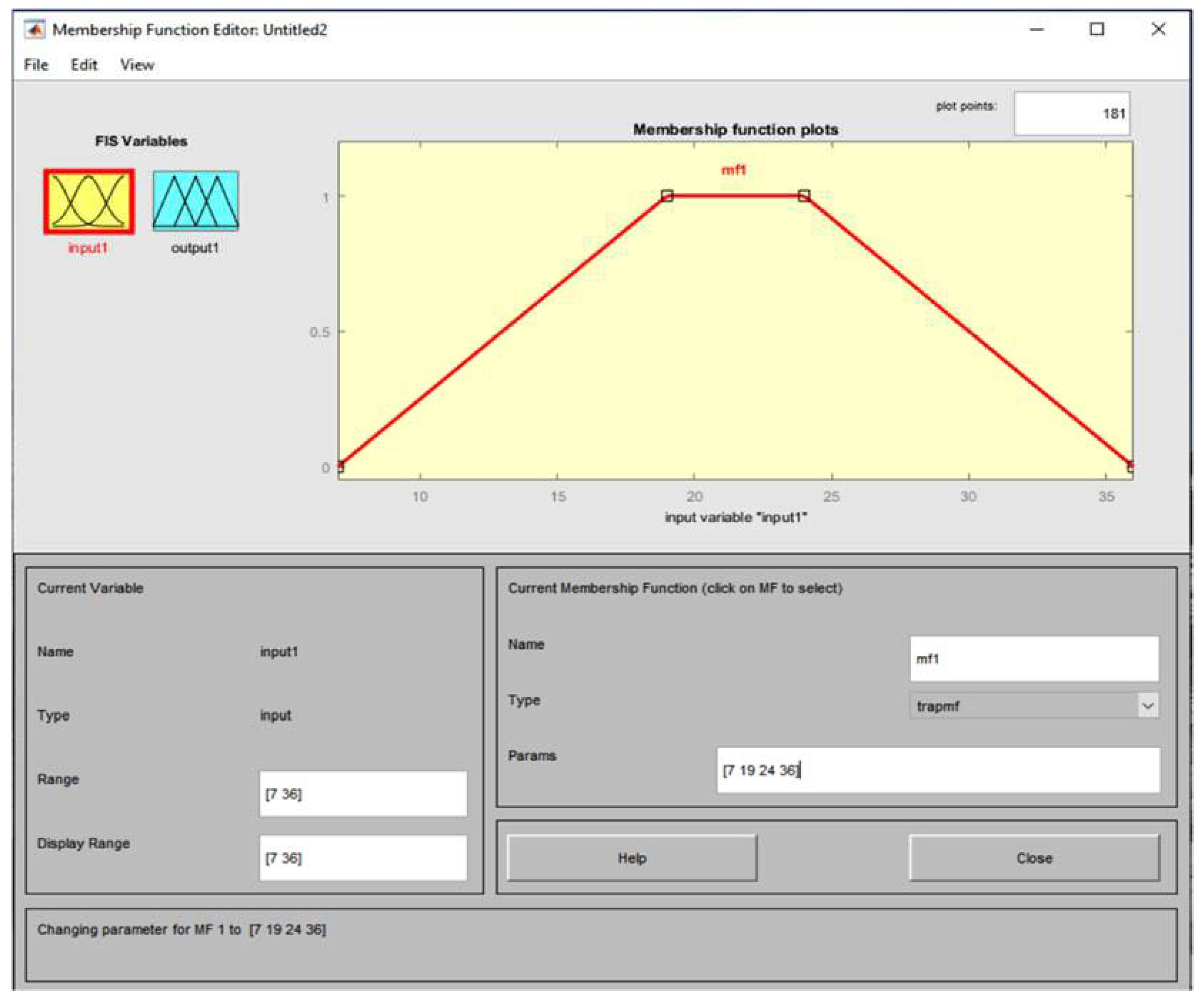
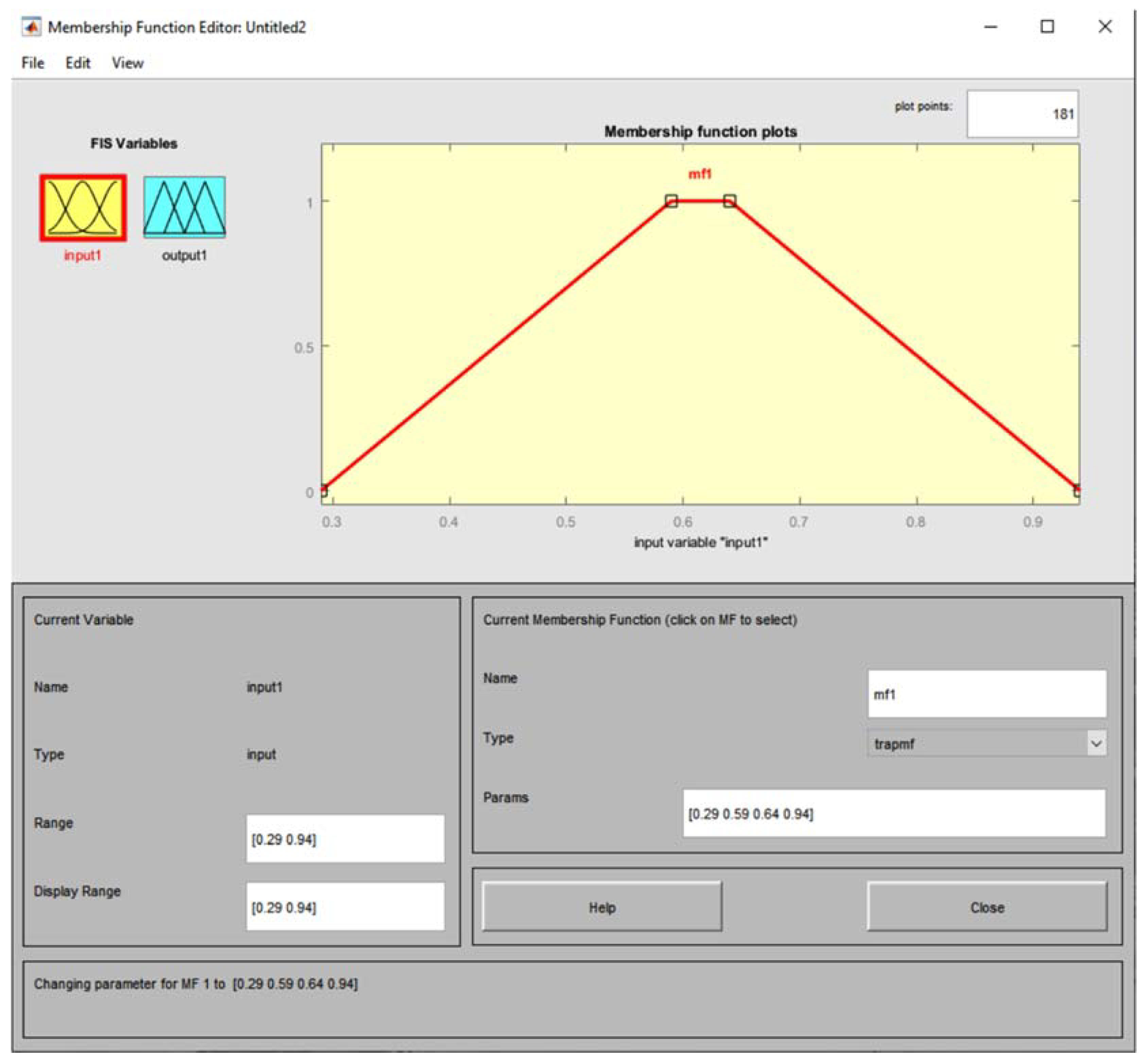
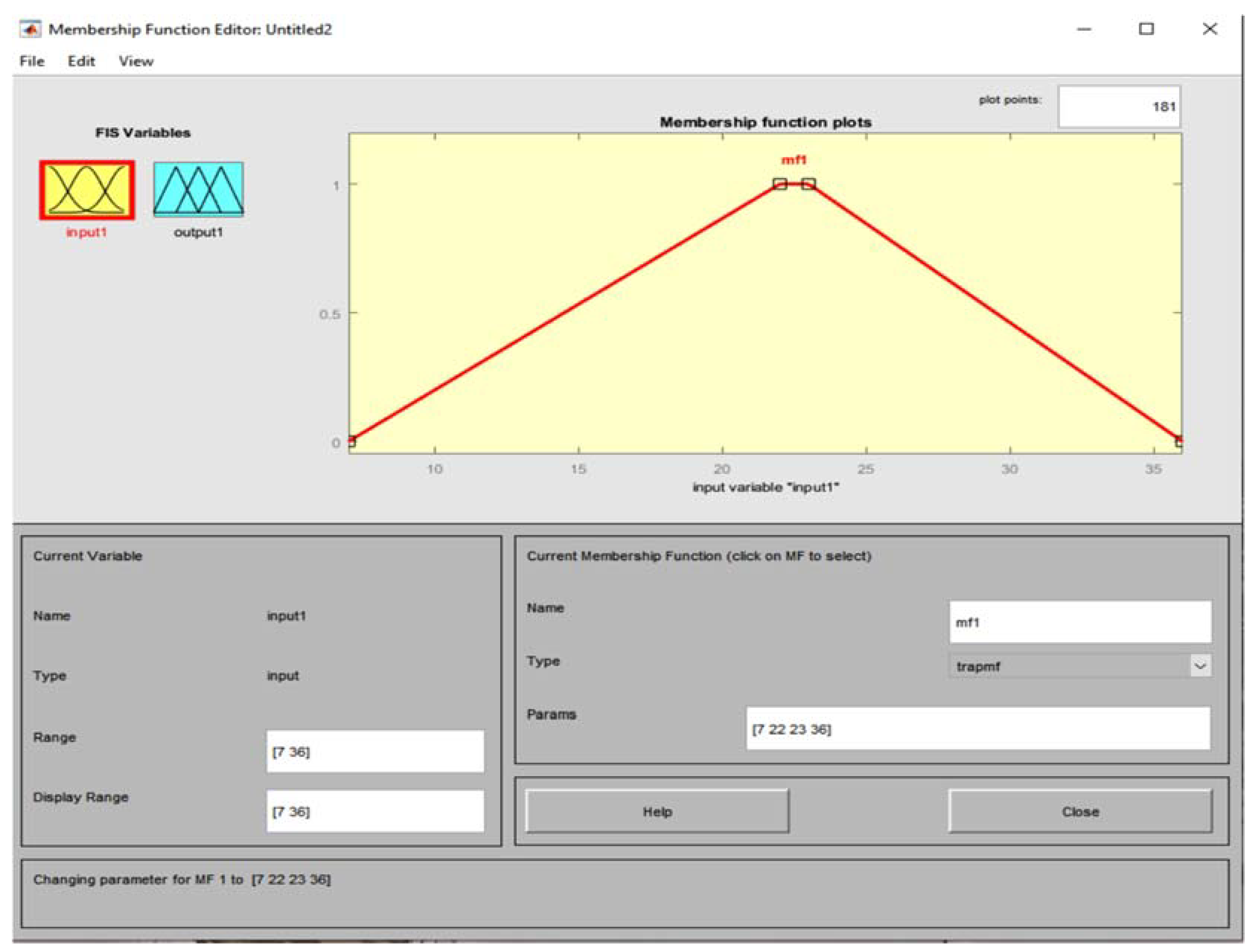
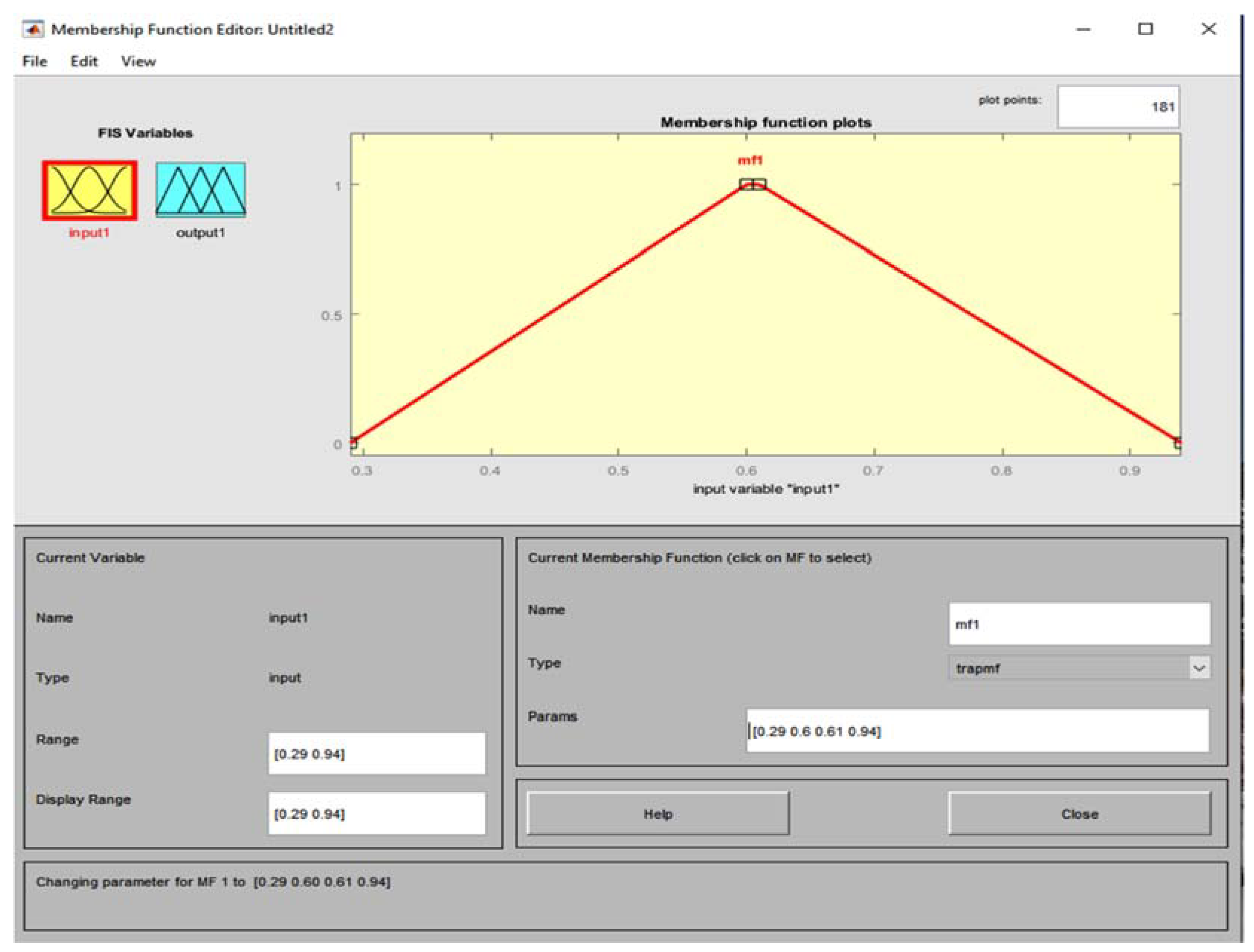
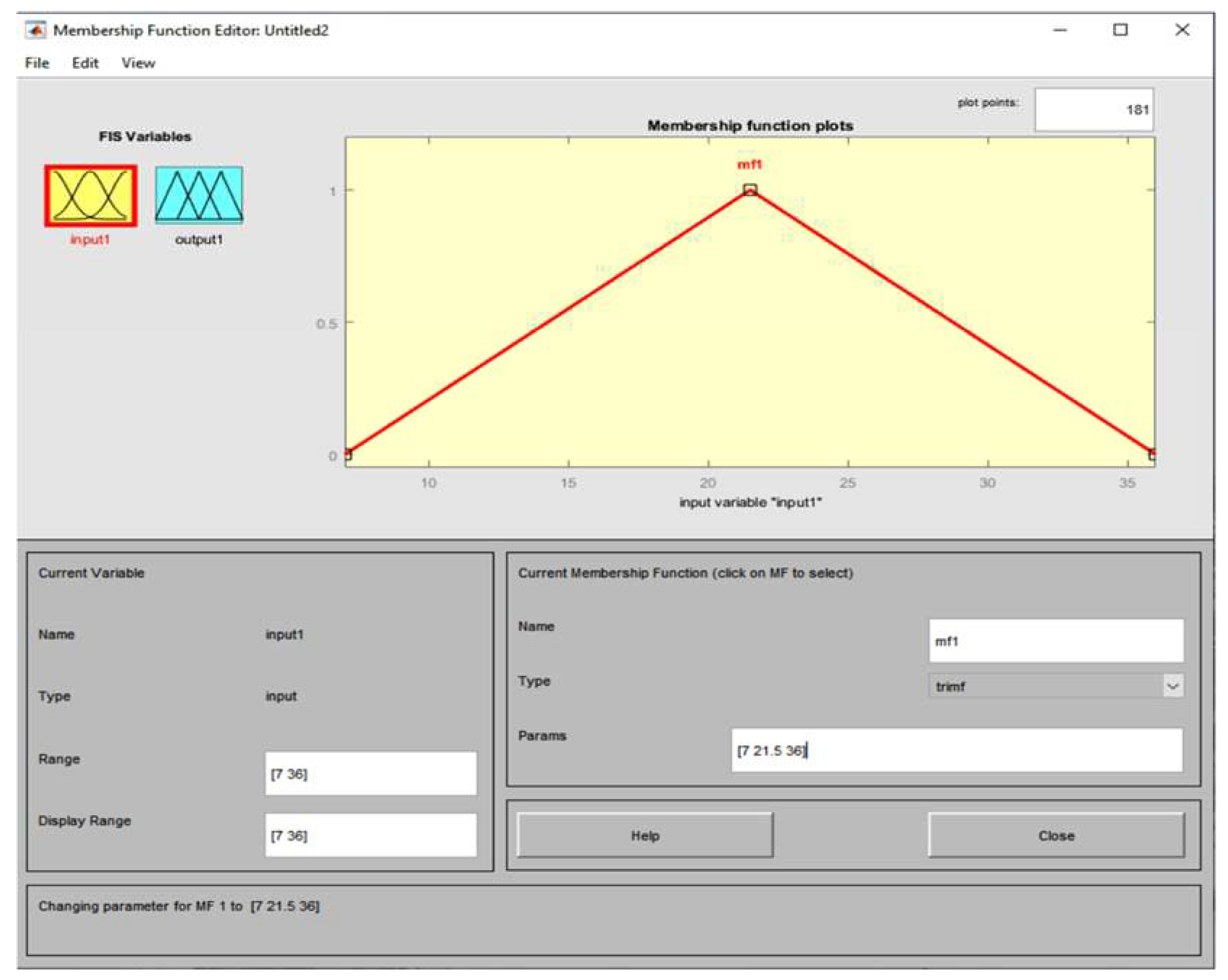
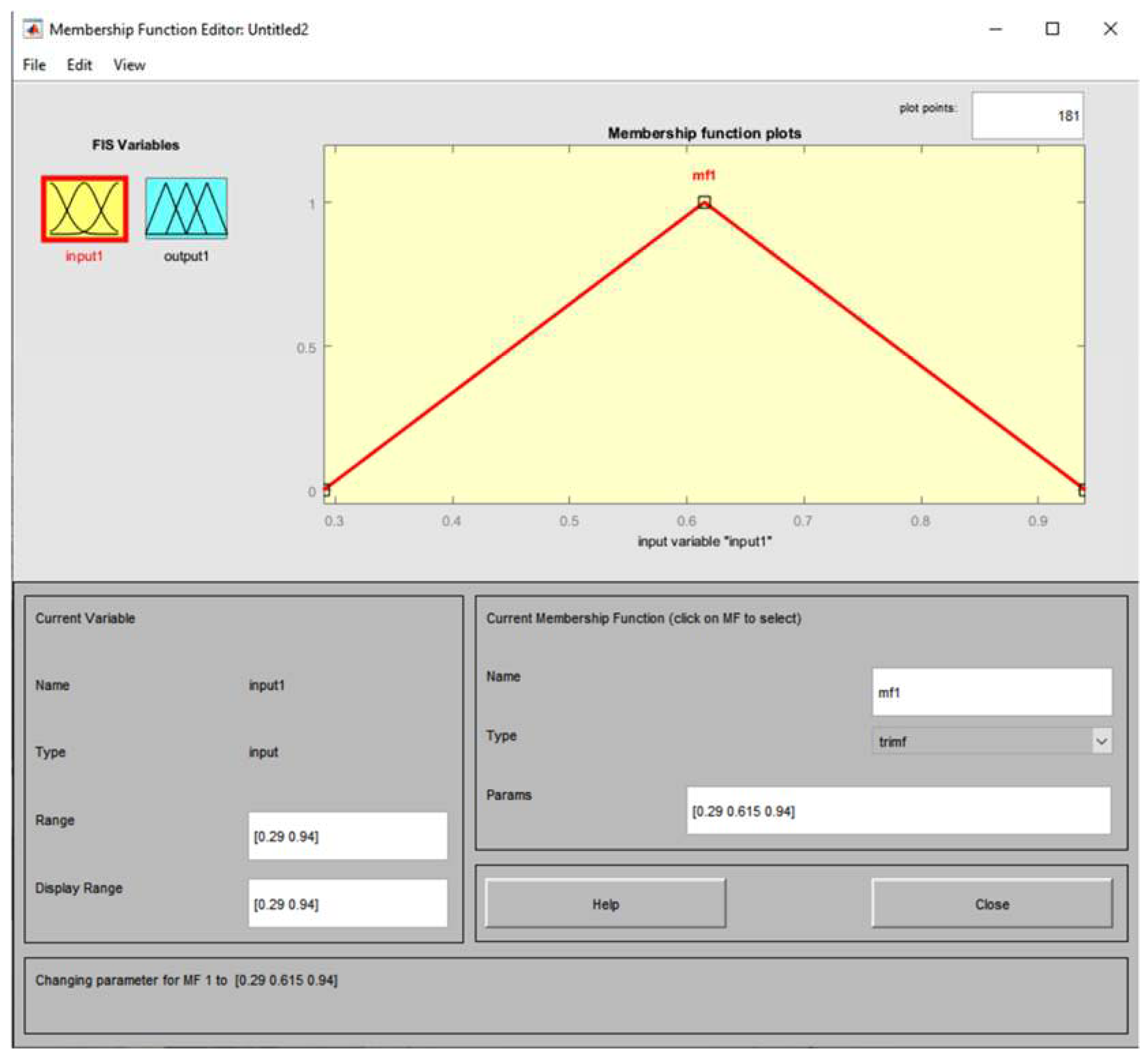

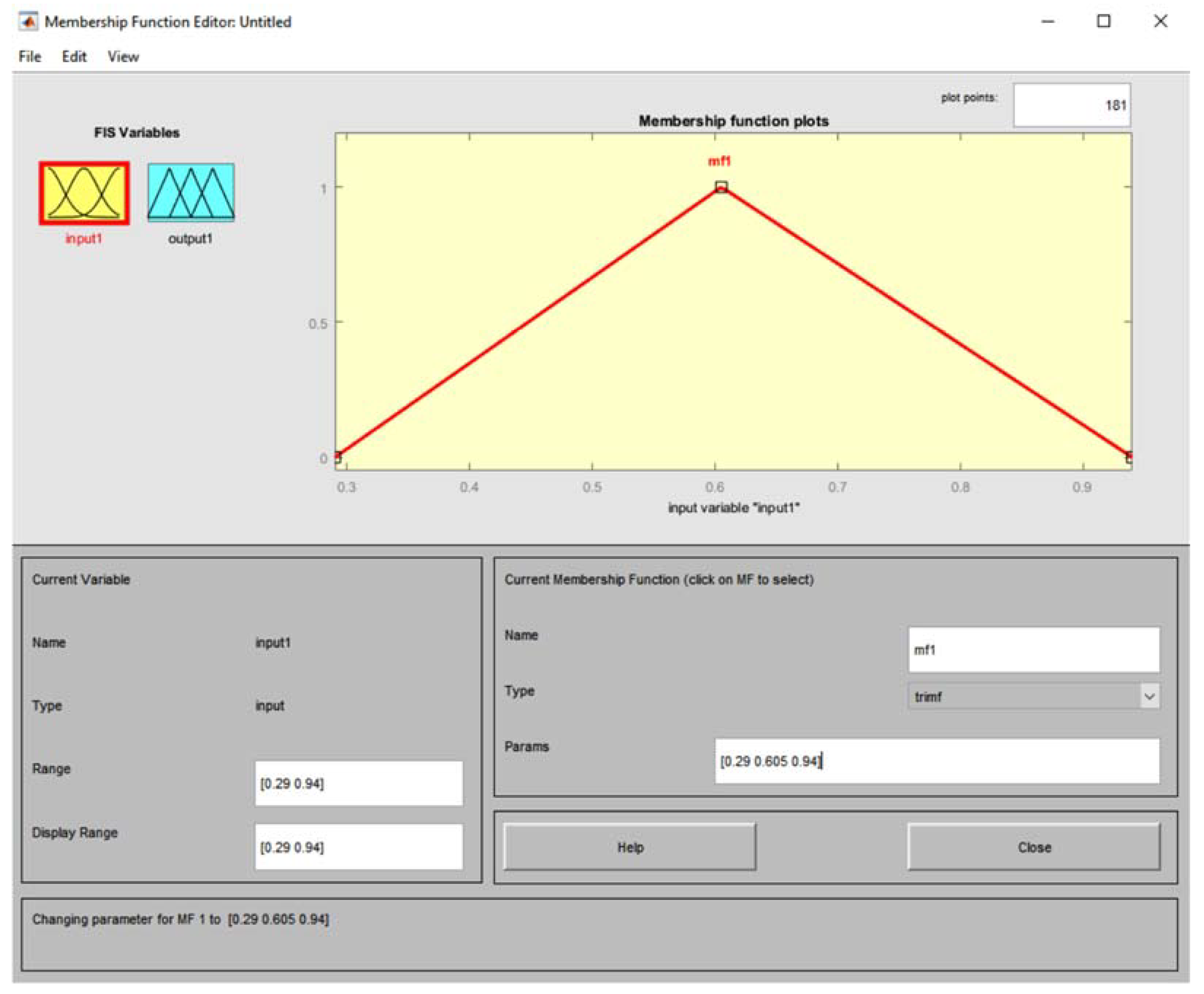
| Value m | Case I1 | Case II2 | |
|---|---|---|---|
| n(x)Vŷm | |||
| ≥0.9 | 19 | 20 | |
| =1 | 239 | 259 | |
| Value m | Case I3 | Case II4 | |
|---|---|---|---|
| n(x)Vŷm | |||
| ≥0.9 | 22 | 21 | |
| =1 | 289 | 269 | |
| Value m | Case I with 19 repetitions | Case I with 239 repetitions | |
|---|---|---|---|
| n(x)Vŷm | |||
| ≥0.9 | 47 | 1 | |
| =1 | 74 | 120 | |
| Value m | Case II with 20 repetitions | Case II with 259 repetitions | |
|---|---|---|---|
| n(x)Vŷm | |||
| ≥0.9 | 61 | 1 | |
| =1 | 60 | 120 | |
| Value m | Case III with 22 repetitions | Case III with 289 repetitions | |
|---|---|---|---|
| n(x)Vŷm | |||
| ≥0.9 | 55 | 1 | |
| =1 | 66 | 120 | |
| Value m | Case IV with 21 repetitions | Case IV with 269 repetitions | |
|---|---|---|---|
| n(x)Vŷm | |||
| ≥0.9 | 61 | 1 | |
| =1 | 60 | 120 | |
Disclaimer/Publisher’s Note: The statements, opinions and data contained in all publications are solely those of the individual author(s) and contributor(s) and not of MDPI and/or the editor(s). MDPI and/or the editor(s) disclaim responsibility for any injury to people or property resulting from any ideas, methods, instructions or products referred to in the content. |
© 2024 by the authors. Licensee MDPI, Basel, Switzerland. This article is an open access article distributed under the terms and conditions of the Creative Commons Attribution (CC BY) license (https://creativecommons.org/licenses/by/4.0/).





